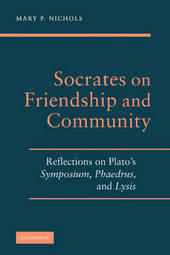
|
Socrates on Friendship and Community: Reflections on Plato's Symposium, Phaedrus,andLysis
Hardback
Main Details
| Title |
Socrates on Friendship and Community: Reflections on Plato's Symposium, Phaedrus,andLysis
|
| Authors and Contributors |
By (author) Mary P. Nichols
|
| Physical Properties |
| Format:Hardback | | Pages:238 | | Dimensions(mm): Height 229,Width 152 |
|
| Category/Genre | Western philosophy - Ancient to c 500 |
|---|
| ISBN/Barcode |
9780521899734
|
| Classifications | Dewey:183.2 |
|---|
| Audience | | Undergraduate | | Postgraduate, Research & Scholarly | |
|---|
|
Publishing Details |
| Publisher |
Cambridge University Press
|
| Imprint |
Cambridge University Press
|
| Publication Date |
24 November 2008 |
| Publication Country |
United Kingdom
|
Description
In Socrates on Friendship and Community, Mary P. Nichols addresses Kierkegaard's and Nietzsche's criticism of Socrates and recovers the place of friendship and community in Socratic philosophizing. This approach stands in contrast to the modern philosophical tradition, in which Plato's Socrates has been viewed as an alienating influence on Western thought and life. Nichols' rich analysis of both dramatic details and philosophic themes in Plato's Symposium, Phaedras, and Lysis shows how love finds its fulfilment in the reciprocal relation of friends. Nichols also shows how friends experience another as their own and themselves as belonging to another. Their experience, she argues, both sheds light on the nature of philosophy and serves as a standard for a political life that does justice to human freedom and community.
Author Biography
Mary P. Nichols is professor of political science at Baylor University. She is the author of numerous books and articles in the history of political thought and politics, literature, and film, including Citizens and Statesmen: A Commentary on Aristotle's "Politics" and Reconstructing Woody: Art, Love, and Life in the Films of Woody Allen.
Reviews'... Nichols's reading of Plato's central dialogues on love and friendship ... combines the resourcefulness and neediness of philosophical eros with the openness and self-awareness of friendship. Her writing thus exhibits the harmony of speech and deed that is the hallmark of genuine philosophers and true friends alike. Read in the spirit in which it is written, her fine book will yield abundant fruit for years to come.' The Review of Politics 'Socrates on Friendship and Community will be of considerable interests to classicists, philosophers, and political theorists alike. It focuses its reflections on three Platonic dialogues, but in so doing contributes much to the appreciation of the suggestive art of Platonic composition generally.' Hermathena
|